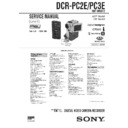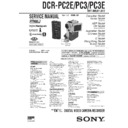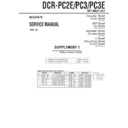Sony DCR-PC2E / DCR-PC3E Service Manual ▷ View online
DCR-PC2E/PC3E
RMT-809/812
AEP Model
UK Model
SERVICE MANUAL
DIGITAL VIDEO CAMERA RECORDER
MICROFILM
D300 MECHANISM
Photo : DCR-PC3E
RMT-812
SPECIFICATIONS
Level 1
— Continued on next page —
Ver 1.0 1999. 06
— 2 —
SAFETY-RELATED COMPONENT WARNING!!
COMPONENTS IDENTIFIED BY MARK
!
OR DOTTED LINE WITH
MARK
!
ON THE SCHEMATIC DIAGRAMS AND IN THE PARTS
LIST ARE CRITICAL TO SAFE OPERATION. REPLACE THESE
COMPONENTS WITH SONY PARTS WHOSE PART NUMBERS
APPEAR AS SHOWN IN THIS MANUAL OR IN SUPPLEMENTS
PUBLISHED BY SONY.
COMPONENTS WITH SONY PARTS WHOSE PART NUMBERS
APPEAR AS SHOWN IN THIS MANUAL OR IN SUPPLEMENTS
PUBLISHED BY SONY.
1.
Check the area of your repair for unsoldered or poorly-soldered
connections. Check the entire board surface for solder splashes
and bridges.
connections. Check the entire board surface for solder splashes
and bridges.
2.
Check the interboard wiring to ensure that no wires are
"pinched" or contact high-wattage resistors.
"pinched" or contact high-wattage resistors.
3.
Look for unauthorized replacement parts, particularly
transistors, that were installed during a previous repair. Point
them out to the customer and recommend their replacement.
transistors, that were installed during a previous repair. Point
them out to the customer and recommend their replacement.
4.
Look for parts which, through functioning, show obvious signs
of deterioration. Point them out to the customer and
recommend their replacement.
of deterioration. Point them out to the customer and
recommend their replacement.
5.
Check the B+ voltage to see it is at the values specified.
6.
Flexible Circuit Board Repairing
• Keep the temperature of the soldering iron around 270˚C
during repairing.
• Do not touch the soldering iron on the same conductor of the
circuit board (within 3 times).
• Be careful not to apply force on the conductor when soldering
or unsoldering.
SAFETY CHECK-OUT
After correcting the original service problem, perform the following
safety checks before releasing the set to the customer.
— 3 —
TABLE OF CONTENTS
SERVICE NOTE
1.
POWER SUPPLY DURING REPAIRS ····························· 4
2.
TO TAKE OUT A CASSETTE WHEN NOT EJECT
(FORCE EJECT) ································································ 4
(FORCE EJECT) ································································ 4
SELF-DIAGNOSIS FUNCTION
1.
Self-diagnosis Function ······················································ 5
2.
Self-diagnosis Dispaly ························································ 5
3.
Self-diagnosis Code Table ·················································· 6
1.
MAIN PARTS
1.
ORNAMENTAL PARTS ···················································· 7
2.
DISASSEMBLY ································································· 9
2-1.
LCD UNIT (PD-112 BOARD, INVERTER
TRANSFORMER UNIT) ················································· 10
TRANSFORMER UNIT) ················································· 10
2-2.
CABINET (R) BLOCK ASSEMBLY ······························ 11
2-3.
CABINET (R) ASSEMBLY, LCD HINGE ASSEMBLY ·· 12
2-4.
ATTACHING HARNESSES OF THE LCD HINGE
ASSEMBLY ····································································· 13
ASSEMBLY ····································································· 13
2-5.
DD-125, VC-220 BOARDS, EVF BLOCK ASSEMBLY · 14
2-6.
MR-41 BOARD, MD BLOCK ········································· 15
2-7.
CONTROL SWITCH BLOCK (FK-4750),
SPEAKER (2.0 CM) ························································ 16
SPEAKER (2.0 CM) ························································ 16
2-8.
CABINET (G) ASSEMBLY ············································ 17
2-9.
CABINET (L) ASSEMBLY ············································· 17
2-10. EVF, LENS BLOCK ························································ 18
2.
GENERAL
Checking supplied accessories ··················································· 19
Quick Start Guide ······································································· 19
Getting started ············································································ 19
Quick Start Guide ······································································· 19
Getting started ············································································ 19
Using this manual ··································································· 19
Step 1 Preparing the power supply ········································· 20
Charging the battery pack ····················································· 20
Installing battery pack ··························································· 21
Connecting to the mains ······················································· 21
Step 2 Inserting a cassette ······················································· 21
Step 3 Using a touch panel ····················································· 21
Step 1 Preparing the power supply ········································· 20
Charging the battery pack ····················································· 20
Installing battery pack ··························································· 21
Connecting to the mains ······················································· 21
Step 2 Inserting a cassette ······················································· 21
Step 3 Using a touch panel ····················································· 21
Recording –Basics ······································································ 22
Recording a picture ································································· 22
Shooting backlit subjects (BACK LIGHT) ··························· 24
Shooting in the dark (NightShot) ·········································· 24
END SEARCH ····································································· 24
Shooting backlit subjects (BACK LIGHT) ··························· 24
Shooting in the dark (NightShot) ·········································· 24
END SEARCH ····································································· 24
Playback –Basics ········································································ 24
Playing back a tape ································································· 24
Viewing the recording on TV ················································· 26
Viewing the recording on TV ················································· 26
Advanced Recording Operations ················································ 26
Photo recording ······································································· 26
Using the wide mode ······························································ 27
Using the fader function ························································· 27
Using special effects –Picture effect ······································· 28
Using special effects –Digital effect ······································· 28
Adjusting the white balance manually ···································· 29
Using the PROGRAM AE function ········································ 29
Adjusting the exposure manually ··········································· 30
Focusing manually ·································································· 30
Using the wide mode ······························································ 27
Using the fader function ························································· 27
Using special effects –Picture effect ······································· 28
Using special effects –Digital effect ······································· 28
Adjusting the white balance manually ···································· 29
Using the PROGRAM AE function ········································ 29
Adjusting the exposure manually ··········································· 30
Focusing manually ·································································· 30
Advanced Playback Operations ·················································· 31
Playing back a tape with picture effects ································· 31
Playing back a tape with digital effects ·································· 31
Quickly locating a scene using the zero set memory
function ··················································································· 31
Searching a recording by date –Date search ··························· 31
Searching the boundaries of recorded tape by title
–Title search ············································································ 32
Searching for a photo-Photo search/Photo scan ····················· 32
Playing back a tape with digital effects ·································· 31
Quickly locating a scene using the zero set memory
function ··················································································· 31
Searching a recording by date –Date search ··························· 31
Searching the boundaries of recorded tape by title
–Title search ············································································ 32
Searching for a photo-Photo search/Photo scan ····················· 32
Editing ························································································ 33
Dubbing a tape ········································································ 33
Editing partially on a DV tape –DV synchro-editing ············· 33
Recording video or TV programmes ······································ 34
Inserting a scene from a VCR ················································· 35
Audio dubbing ········································································ 36
Superimposing a title ······························································ 37
Making your own titles ··························································· 37
Labeling a cassette ·································································· 38
Editing partially on a DV tape –DV synchro-editing ············· 33
Recording video or TV programmes ······································ 34
Inserting a scene from a VCR ················································· 35
Audio dubbing ········································································ 36
Superimposing a title ······························································ 37
Making your own titles ··························································· 37
Labeling a cassette ·································································· 38
Customizing Your Camcorder ···················································· 38
Changing the menu settings ···················································· 38
Resetting the date and time ····················································· 40
Resetting the date and time ····················································· 40
“Memory Stick” operations ························································ 40
Using a “Memory Stick” –introduction ·································· 40
Recording still images on “Memory Stick”s
–Memory photo recording ······················································ 42
Superimposing a still picture in a “Memory Stick”
on a moving picture –MEMORY MIX ··································· 43
Recording an image from a mini DV tape as a still image ····· 44
Copying still images from a mini DV tape –Photo save ········· 45
Viewing a still picture –Memory photo playback ··················· 45
Playing back images in a continuous loop –SLIDE SHOW ····· 46
Preventing accidental erasure –Image protection ··················· 47
Deleting images ······································································ 47
Writing a print mark –PRINT MARK ···································· 48
Recording still images on “Memory Stick”s
–Memory photo recording ······················································ 42
Superimposing a still picture in a “Memory Stick”
on a moving picture –MEMORY MIX ··································· 43
Recording an image from a mini DV tape as a still image ····· 44
Copying still images from a mini DV tape –Photo save ········· 45
Viewing a still picture –Memory photo playback ··················· 45
Playing back images in a continuous loop –SLIDE SHOW ····· 46
Preventing accidental erasure –Image protection ··················· 47
Deleting images ······································································ 47
Writing a print mark –PRINT MARK ···································· 48
Additional Information ······························································· 48
Using the viewfinder ······························································· 48
Usable cassettes ······································································ 48
Troubleshooting ······································································ 49
Self-diagnosis display ····························································· 50
Warning indicators and messages ··········································· 51
Using your camcorder abroad ················································· 51
Maintenance information and precautions ······························ 51
Usable cassettes ······································································ 48
Troubleshooting ······································································ 49
Self-diagnosis display ····························································· 50
Warning indicators and messages ··········································· 51
Using your camcorder abroad ················································· 51
Maintenance information and precautions ······························ 51
Quick Reference ········································································· 53
Identifying the parts and controls ··········································· 53
— 4 —
1.
POWER SUPPLY DURING REPAIRS
In this unit, about 10 seconds after power is supplied to the battery
terminal using the regulated power supply (4.2V), the power is shut
off so that the unit cannot operate.
This following two methods are available to prevent this. Take note
of which to use during repairs.
terminal using the regulated power supply (4.2V), the power is shut
off so that the unit cannot operate.
This following two methods are available to prevent this. Take note
of which to use during repairs.
Method 1.
Connect the servicing remote commander RM-95 (J-6082-053-B)
to the LANC jack, and set the commander switch to the “ADJ”
side.
to the LANC jack, and set the commander switch to the “ADJ”
side.
Method 2.
Use the AC power adaptor (AC-VF10).
2.
TO TAKE OUT A CASSETTE WHEN
NOT EJECT (FORCE EJECT)
NOT EJECT (FORCE EJECT)
1 Refer to 2-2 to remove the accessory shoe and NS block
assembly.
2 Refer to 2-2 to remove the jack ornamental plate.
3 Refer to 2-2 to remove the tripod screw.
4 Refer to 2-2 and 2-3 to remove the cabinet (R) block assembly.
5 Refer to 2-5 to remove the microphone unit.
6 Refer to 2-5 to remove the battery plate.
7 Refer to 2-5 to remove DD-125 board.
8 Refer to 2-5 to remove EVF and lens block.
9 Refer to 2-6 to remove the cabinet (L) block assembly.
0 Open MR-41 board.
!¡ Disconnect CN2504 (4P, 0.8mm) of MR-41 board.
!™ Add +4.5V from the DC POWER SUPPLY and unload with a
3 Refer to 2-2 to remove the tripod screw.
4 Refer to 2-2 and 2-3 to remove the cabinet (R) block assembly.
5 Refer to 2-5 to remove the microphone unit.
6 Refer to 2-5 to remove the battery plate.
7 Refer to 2-5 to remove DD-125 board.
8 Refer to 2-5 to remove EVF and lens block.
9 Refer to 2-6 to remove the cabinet (L) block assembly.
0 Open MR-41 board.
!¡ Disconnect CN2504 (4P, 0.8mm) of MR-41 board.
!™ Add +4.5V from the DC POWER SUPPLY and unload with a
pressing the cassette compartment.
SERVICE NOTE
: Unloading
: Loading
Loading motor
Disconnect from CN2504 of MR-41 board.
MR-41
BOARD



